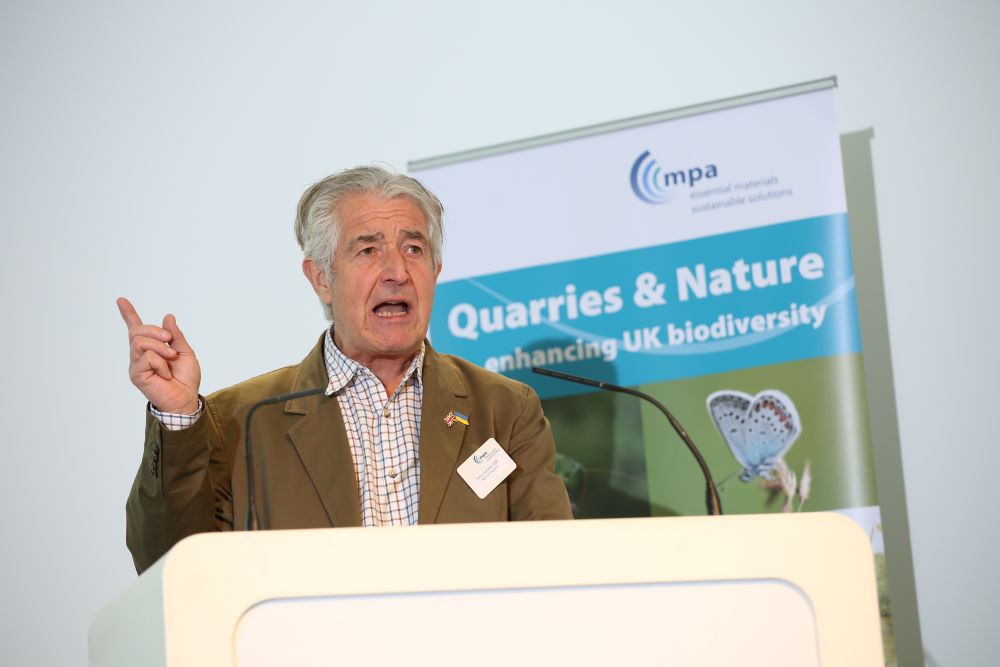Quarries and Nature 2025: Celebrating the Mineral Industry’s Role in Nature Recovery
Extracting the raw materials required to create essential homes and infrastructure need not be at the expense of natural habitats. A recent awards event, organised by the Mineral Products Association (MPA), showcased the UK mineral industry’s contribution to creating spaces for nature and improving biodiversity.
As we move into spring, it is not just migratory birds that will be flocking to wetlands, pools, and woodlands. Many families will also be enjoying visiting local nature reserves where they can get closer to nature. Some of those reserves will have started life as quarries, where the minerals that make modern life possible were originally extracted.
The transformation of former quarry sites into thriving habitats is one of the nation’s environmental success stories. Yet, it is a contribution that is not always acknowledged by policymakers or the wider public.
 Tony Juniper, Chair of Natural England
Tony Juniper, Chair of Natural England
A recent awards ceremony, organised by the Mineral Products Association (MPA), provided the opportunity to change that narrative by celebrating the industry’s role in biodiversity and restoration. Senior figures from government and conservation bodies joined industry leaders to highlight the scale of what has been achieved to date and set a clear ambition to do even more.
“It feels like we've taken another step on the journey of aligning a key resources sector with the big job of effective nature recovery in this country,” Tony Juniper, Chair of Natural England, told the event. “Some of the examples we have seen today are truly mind-blowing.”
Juniper also voiced a hope that the work carried out to date will inspire even greater change and provide a foundation that can be used to accelerate future progress.
“If this is done right,” Juniper told guests, “it could be so much better for wildlife than what we have now. Some of the best places to see nature are former quarries.”
Guests heard that, at a time when the UK is under mounting pressure to meet its biodiversity and climate targets, the mineral products sector is an industry that is not just minimising its footprint but actively enhancing the natural world. Already, over 83 square kilometres - an area larger than Nottingham - have been restored with priority habitats., with another 110 square kilometres in the pipeline. These landscapes provide a refuge for wildlife squeezed out of traditional farmland and urban sprawl.
Environmental leaders recognise and welcome the importance of the habitats that the industry is working with partners to create. Beccy Speight, Chief Executive of the RSPB, told guests that she believes that the sector is playing a vital role in delivering spaces for nature at a critical time.
“The climate and biodiversity crises are here. They are not abstract concepts, - they are happening right now,” Speight said. “I’d like to congratulate you on being an industry that is absolutely proving on the ground that you can do economic growth, and you can do nature too,”
Speight’s focus on the urgency of the issue is backed up by data. She reminded the event that the 2023 State of Nature report painted a bleak picture, revealing that the UK is one of the most nature-depleted countries in the world. Against that backdrop, the kind of large-scale habitat creation seen in quarry restorations is, in Speight’s words, “not just desirable but essential.”
“This industry is creating the space for nature to recover,” Speight told the event. “That is crucial as wildlife struggles to cope with climate pressures. These awards aren’t just recognition - they are a catalyst for further change.”
 More than 200 representatives from MPA members, planning authorities, and conservation groups attended the event
More than 200 representatives from MPA members, planning authorities, and conservation groups attended the event
That need to focus on the future was also taken up by Lex Russell, Chair of the MPA and MD of CEMEX UK. He reminded attendees that the wider industry has a critical role to play if the nation is to meet the growing need for materials it needs to reshape and improve the built environment.
“From the delivery of new housing to the maintenance of our road network, and low-carbon energy infrastructure, the mineral products sector has never been more important,” Russell told guests. But he was equally clear that the national drive for growth must be met in a way that does not only protect but also ultimately enhances the UK’s natural habitats.
“The legacy we have created is astonishing. While other sectors talk about potential, we have actually delivered,” Russell said.
As speakers explained, the mineral products sector has never been more important to the success of our economy, yet its contribution is often overlooked by politicians and policymakers. That lack of recognition is somewhat surprising for an industry that supports 80,000 jobs in the UK and contributes £8 billion in added value to the economy.
However, alongside that unarguable economic value, speakers were clear that the sector is also delivering a substantial dividend for nature.
“The work of the minerals industry is not an environmental problem,” Juniper said, “It’s a massive environmental opportunity for a country that's struggling to meet all of its competing goals.”
Rob Stoneman, Director of Landscape Recovery at the Wildlife Trusts, echoed Juniper’s call to action and pointed to international examples, where the minerals industry has collaborated with conservation groups to create extensive, joined-up habitats.
“We can do that here in the UK, so let’s take it up another level,” Stoneman told the event. “Every planning application should be nature-positive, regardless of legislation. Your permission to quarry from society is greatly extended if you do that.”
The award-winning projects recognised at the event demonstrate the real impact that is achieved when industry, government, and conservation bodies work together. The challenge now is to ensure that this work continues at pace and scale alongside the push to source materials for more homes and new infrastructure.
There was also a closing plea for everyone in the sector to play their part in helping increase understanding of one of the nation’s least recognised environmental success stories.
“There’s so much nonsense talked about our industry and so little understanding of what we actually do,” said Chris Leese from the MPA. “We need to be shouting about this from the rooftops.”
